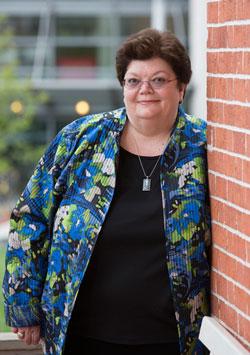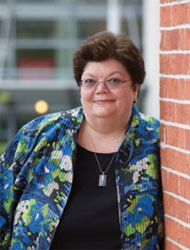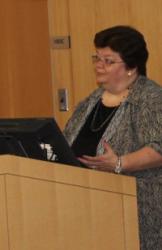School Hosts Annual Teaching Excellence Day
Residents, faculty, and preceptors learn skills needed for effective presentations, teaching, and information sharing
By Dana Joyce
August 12, 2013
On July 25, 80 faculty, preceptors, and residents assembled at the University of Maryland School of Pharmacy (SOP) for the School’s annual Teaching Excellence Day, a continuing education course focused on developing and enhancing educators’ skills and techniques with both students and patients. Organized by Mary Lynn McPherson, PharmD, a professor of pharmacy practice and science (PPS) and the department’s vice chair of academic affairs, the event introduced participants to new educational technologies, provided instruction on student advising, and offered tips on incorporating student pharmacists into their practice settings.
The day began with welcome remarks from Natalie D. Eddington, PhD, FAAPS, FCP, dean and professor of the School, who emphasized that the course is intended to provide skills and a foundation for the attendees’ careers as teachers in the classroom, lab, clinic, and anywhere else they might practice. Though the room was filled with new educators, many of the School’s longstanding faculty members participate in the event each year to continually enhance and grow their teaching skills and abilities.
“I’m always looking for ideas to keep teaching in the classroom fresh and exciting. In the past, I have taken away some good ideas to incorporate active learning in the classroom and to better engage students in their learning experience,” says James Trovato, PharmD, an associate professor in PPS.
Advancements in interactive technology were a major focus of this year’s event. George Anagnostou, a senior instructional technology specialist at the School, presented several technologies that can increase student engagement, such as real-time audience response surveys and interactive quizzes in Blackboard, an online learning management system that allows faculty to post resources for students, manage online courses, and utilize discussion and assessment tools to enhance teaching and learning.
“I plan on including audience response systems throughout many of my lectures, as these allow students to see, hear, and most importantly, apply information learned in the classroom,” said Sam Houmes, PharmD, a first year community pharmacy resident practicing at Professional Pharmacy.
Cherokee Layson-Wolf, PharmD, the School’s associate dean for student affairs and an associate professor in PPS, and Tim Rocafort, PharmD, an assistant professor in PPS, demonstrated several smart phone applications, or “apps”, that can engage students and help patients manage their medications.
“Using apps has enhanced my daily patient care interactions by enabling patients to play a more active role in the management of their medical conditions,” says Rocafort.
McPherson started Teaching Excellence Day more than 10 years ago. “Just being an expert in your field doesn’t mean you are necessarily an effective teacher. I want the residents, our faculty, and preceptors to catch the passion as well, and understand that how you design educational experiences is as, or more important, than what you teach,” she said. “We are learning more and more about the importance of active learning, and the role of social media in learning. Educators today need to meet students where ‘they’ are.”



